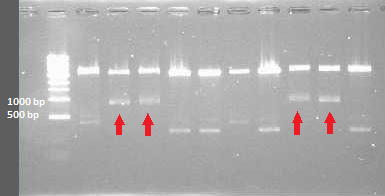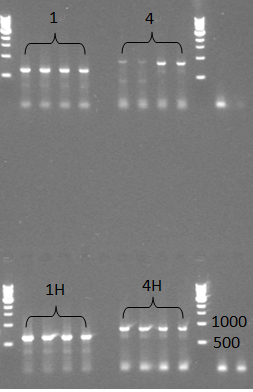Team:Wageningen UR/Journal/week14
From 2012.igem.org
(→Lab work) |
Jjkoehorst (Talk | contribs) |
||
| Line 25: | Line 25: | ||
''' Hepatitis B ''' | ''' Hepatitis B ''' | ||
| - | ''30.July'' | + | ''30. July'' |
* Miniprepping of successful transformants from the transformation (Hep B + BBa_J04500) | * Miniprepping of successful transformants from the transformation (Hep B + BBa_J04500) | ||
| Line 31: | Line 31: | ||
| - | ''1.August'' | + | ''1. August'' |
-> the digestion check was repeated 2 times (once with a longer incubation time and once with a higher amount of DNA in the digestion mixture) until the insert size could be seen on the gel | -> the digestion check was repeated 2 times (once with a longer incubation time and once with a higher amount of DNA in the digestion mixture) until the insert size could be seen on the gel | ||
Revision as of 13:46, 24 September 2012
week 14: 30 july - 5 august
Lab work
General
PCR st.10 Berkeley KILR
Follow up of the experiment started in week 9 to switch the BBa_K197022 into a iGEM standard 10 compatible pSB1C3 backbone. Two self-designed primers were used to amplify the KILR construct out of the original BBa_K197038 backbone .
- FW primer Berkeley KILR: 5’ GTTTCTTCGAATTCGCGGCCGCTTCTAGAGGATCTGTTAAAGAACTGGAAGACAAAAA 3’
- BW primer Berkeley KILR: 5’ TACTAGTAGCGGCCGCTGCAGGAAGAAACCGCAACCACCACGTTCAC 3’
PCR purification of the two samples with a kit of Thermo Scientific (yield: ca. 40 ng/µl)
digestion PCR product Berkeley coil
Prerequired step for the final ligation into pSB1C3. Both donor backbone (BBa_J04450) and the PCR product were digested with the same approach by using the restriction enzymes EcoRI and PstI. Using PstI requires another PCR purification (yield: ca.15 ng/ µl) before ligation and transformation.
Hepatitis B
30. July
- Miniprepping of successful transformants from the transformation (Hep B + BBa_J04500)
- Digestion check of those minipreps
1. August
-> the digestion check was repeated 2 times (once with a longer incubation time and once with a higher amount of DNA in the digestion mixture) until the insert size could be seen on the gel
-> the digestion check confirmed the right insert sizes in the samples they where expected (around 800bp)
TuYV
- The four 'brickable' TuYV CP gene amplicons (1,1H,4,4H) were digested, ligated into the backbone from BBa_J04450, which is ampicillin resistant and transformed into our electrocompetent Mach1 E coli.
- Colony check: We saw many colonies on all 4 sample plates this time.
- We did two colony PCR to check the samples, but we got negative results from the colony PCR. Even so, we still continued to miniprep those colonoes which were used for colony PCR and checked them with normal PCR later, this time we saw expected bands for all 4 samples, which should be around 600bp for 1(TuYV coat protein) and 1H(TuYV coat protein with his-tag) and 800bp for 4(TuYV coat protein with partial readthrough) and 4H (TuYV coat protein with partial readthrough with his-tag).
PLRV
The PCR products obtained after Reverse Transcription followed by PCR were used as template to add iGEM prefix and suffix. The products were inserted into the backbone with Ampicilin/Kanamycin resistance.
Also the PLRV coat protein plus read trough (PLRV CP_RT) was obtained by PCR reactions. We wanted to add iGEM prefix and suffix to that gene but after successful addition we found out that there are two illegal restriction sites in the read through part. This was concluded from the DNA sequences available in the GenBank database.
 "
"











